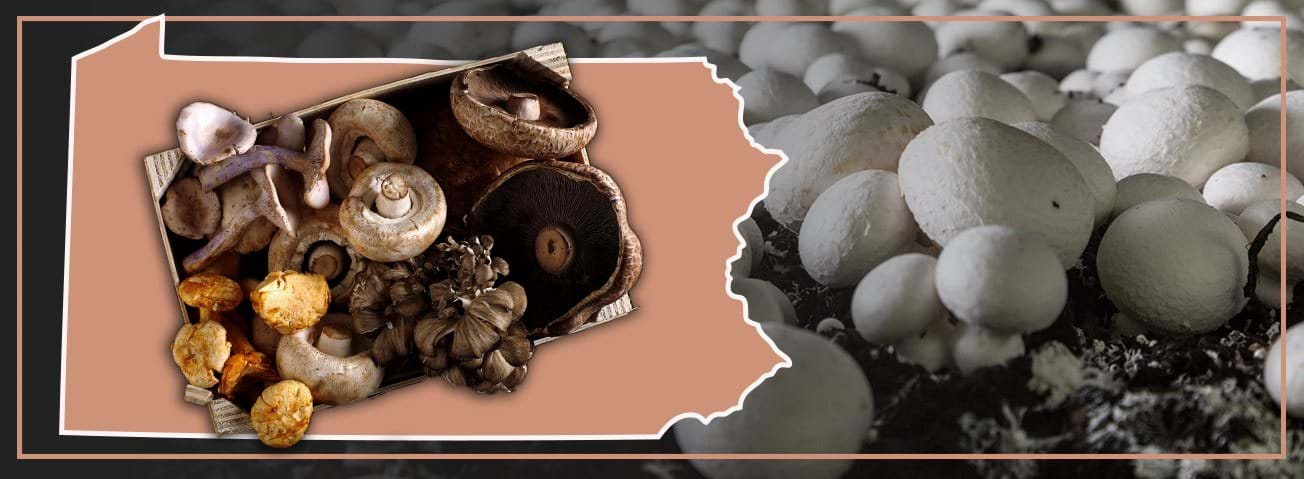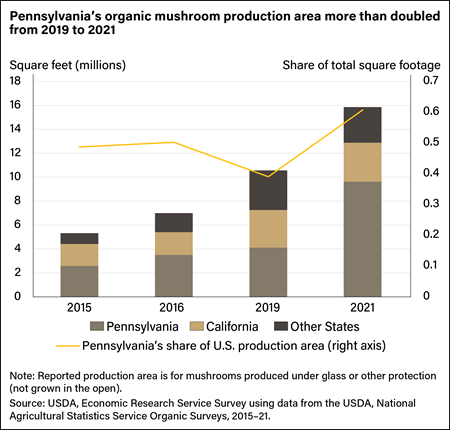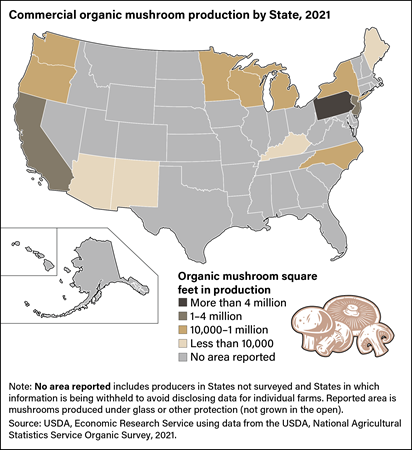Organic Mushroom Production Concentrated in Pennsylvania

Sales and the retail market share of organic mushrooms have risen in the last decade, and U.S. farmers—especially in Pennsylvania—have increased organic mushroom production to accommodate growing consumer demand. In 2009, organic mushrooms accounted for 2 percent of the total retail mushroom market, a share that grew to 11 percent by 2021. Organic mushroom production increased from 17 million pounds in the marketing year 2009/10 (July–June) to 114 million pounds of mushrooms that were certified organic during the 2022/23 growing season. Mushrooms generally are grown indoors, under glass or in a controlled environment, so natural soil and temperature conditions may not matter in deciding where they are grown. In the United States, the leading producer of mushrooms—organic as well as conventional—is Pennsylvania, followed by California. Pennsylvania has been a major producer of mushrooms since the 1880s, and today its growers have developed specialized knowledge and housing equipped with proper ventilation needed for extensive mushroom production.
In 2021, about 9 percent of U.S. organic mushroom farms (under glass or other protection) were in Pennsylvania, compared with 5 percent in California, according to the National Agricultural Statistics Service’s Organic Survey in December 2022. Pennsylvania grew organic mushrooms on 9.6 million square feet of production area, 61 percent of total U.S. organic mushroom square footage. California farms operated on 3.3 million square feet according to the survey. Moreover, the amount of area producing organic mushrooms in Pennsylvania in 2021 had more than doubled since 2019, when it was 4.1 million square feet, or 40 percent of the Nation’s organic mushrooms. The trend follows that of the conventional market, where Pennsylvania accounted for almost 75 percent of the area of total mushroom production.
Aside from the longstanding specialized knowledge of mushroom cultivation in the State, Pennsylvania has other advantages that may contribute to its dominance in the organic mushroom market. Its producers also enjoy proximity to other organic production systems that can support crop production standards in line with the protocols in USDA’s National Organic Program. Organic mushroom production relies on organic feedstock such as organic hay, straw-bedded horse manure, and poultry manure as a substrate (the surface material on which mushrooms are grown). Because Pennsylvania also is a major organic layer chicken producer, with about 11 percent of total peak inventory in 2021, the local layer industry can provide a consistent supply of manure for substrate to mushroom producers. California is also a major organic layer chicken producer, with more than 8 percent of total peak inventory in 2021.
Vegetables and Pulses Outlook: December 2022, by Wilma V. Davis, Catharine Weber, Gary Lucier, and Sharon Raszap Skorbiansky, ERS, December 2022
U.S. Organic Production, Markets, Consumers, and Policy, 2000–21, by Andrea Carlson, Catherine Greene, Sharon Raszap Skorbiansky, Claudia Hitaj, Kim A. Ha, Michel Cavigelli, Peyton Ferrier, and William D. McBride, ERS, March 2023
Organic Agriculture, by Sharon Raszap Skorbiansky, USDA, Economic Research Service, January 2024
Organic Mushroom Industry Expands To Meet Rising Consumer Interest, by Catharine Weber and Sharon Raszap Skorbiansky, USDA, Economic Research Service, July 2023



